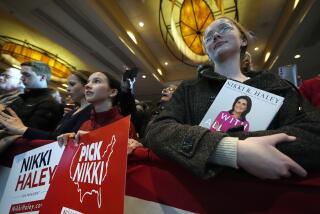Bush Must Say Goodbye to Party Fringe
- Share via
Once again, the media blew it.
The important story last week was not that Pat Buchanan apologized for Adolf Hitler and held the United States accountable for the Holocaust, but rather that George W. Bush still curries the favor of that anti-Semitic lout. Buchanan, that is, not Hitler, who, whatever his past sins, does not currently threaten to siphon votes away from the Republican Party.
Were Hitler to suddenly emerge as a potential Reform Party rival, then he, too, might have to be courted. But until Buchanan raises the Fuehrer from the dead, that is not Bush’s pressing concern. Buchanan is. He represents much of what marginalizes the Republican Party, the loose elephant befouling the big tent.
Bush failed to rise to the occasion, instead cravenly demonstrating that he is not about to sacrifice a single vote, no matter how loathsome, for principle. “I’m going to need every vote I can get among Republicans to win the election,” Bush bleated in an appeal to Buchanan to stay within the party.
For that reason, Bush pointedly refused to follow the lead of Sen. John McCain (R-Ariz.) in frontally attacking Buchanan’s obscene notion that it was the U.S. entry into the war against Hitler, and not Hitler’s march through Europe, that was a threat to the world and the cause of the Holocaust.
Maybe foreign policy is not Bush’s strong suit, but surely his own father--and that bevy of former foreign policy honchos that the old man sent over--must have warned George W. that Buchanan was not playing with a full deck. It’s a bit late to be reviving the line of Hitler’s appeasers who insisted that the leader of the master race would have been satiated with the conquest of Eastern Europe and Russia and would have left the Jews and other of his victims alone.
A visitor to one of those Holocaust memorials that Buchanan has maligned would learn that the majority of Jews and others exterminated by Hitler lived in the area to the east of Germany that Buchanan ceded to Hitler’s rule. He or she might also gag at the assertion in Buchanan’s new book that the Nazi occupation of France was somehow benign. The implication is that if a Nazi-controlled puppet government was good enough for the French, it might have worked out quite well for Britain and the U.S.
Of course George W. knows better. He is a bright centrist who must find Buchanan’s demagoguery thoroughly unpalatable. But his failure to take Buchanan to task and state clearly that he doesn’t want the support of those who seek a posthumous rationalization of Hitler’s madness is a damning revelation of the GOP front-runner’s opportunism. Pandering to the worst elements in the GOP is a prescription for disaster for the party and the country should Bush win.
Like his father, George W. is a moderate Republican, which in the post-Eisenhower-Nixon decades has meant catering to the lunatic fringe that provides the party with its grass-roots vitality: A grass-roots preoccupied with divisive but marginal social issues at home, frozen in nostalgia for a purer world that never was, and warming instantly to the jingoistic appeals of a Buchanan for a new form of America First in foreign policy, coupled with immigrant- and Hollywood-bashing.
The extremists active in the Republican base care not a whit for the true mission of the Republican Party, as defined by the corporate contributors who give the party its pronounced financial edge: Tax breaks for the rich, hobbled public oversight of corporate shenanigans and a safer world for foreign investments. Being enlightened capitalists, they are also compassionate conservatives who believe that enough crumbs must drop from the table to lull the rest of us.
Their position is not all that far from the centrist Democrats like Gore and Bradley who threaten Bush’s march to the White House. That is why Clinton has consistently secured so many wealthier crossover Republican votes. True, these centrists in the Democratic Party have their critics, but they have been tamed; under Clinton’s tenure the Democratic leadership has quelled the voices of those in the party who might object to the New World order.
It is Bush’s challenge to prove to the business community he can do the job better, but first he must demonstrate the resolve to free the party from its fringe. Otherwise, if he wins, the ultra-right will continue to guide Congress--determining everything from trade agreements to judicial appointments--and render his presidency, like his father’s, a floundering mess.
More to Read
Get the L.A. Times Politics newsletter
Deeply reported insights into legislation, politics and policy from Sacramento, Washington and beyond. In your inbox twice per week.
You may occasionally receive promotional content from the Los Angeles Times.










